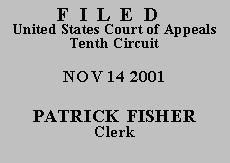

| THEODORE GATEWOOD,
v.
GARY WATKINS; KEN SALAZAR,
|
No. 01-1286
(D.C. No. 01-Z-805) (D. Colo.) |
Gatewood pled guilty to theft in Colorado state court on October 4, 2000. He was sentenced to three years imprisonment. Gatewood did not file a direct appeal, but through counsel he did file a post-conviction motion for reconsideration. The state court denied the motion on February 16, 2001. Gatewood has not filed any other post-conviction motions.
He filed a petition for writ of habeas corpus under 28 U.S.C. § 2254 on May 2, 2001. On May 11, 2001, Gatewood was ordered to show cause why the action should not be dismissed for failure to exhaust state remedies. The district court found no excuse for his failure to exhaust and dismissed.
"An application for a writ of habeas corpus . . . shall not be granted unless it appears that (A) the applicant has exhausted the remedies available in the courts of the State." 28 U.S.C. § 2254(b)(1). "Generally, when a habeas petitioner has failed to exhaust his state court remedies, a federal court should dismiss the petition without prejudice so that those remedies may be pursued." Demarest v. Price, 130 F.3d 922, 939 (10th Cir. 1997).
The district court correctly concluded that because Gatewood failed to present his habeas claims to the state courts, he has not exhausted state remedies for those claims. Gatewood claims he is unable to exhaust state remedies because he has a mental disorder and there is no bonding process at the state level for a post-conviction motion for reconsideration. He further asserts that there is no corrective state process because the statute of limitations has run on his direct appeal. The exhaustion requirement is "not to be lightly overlooked," Id, 130 F.3d at 933, and there is no reason that any of Gatewood's claims prevent him from presenting his federal constitutional claims to the state court first.
Accordingly, we DENY Gatewood's request for a certificate of appealability, finding he has not made a substantial showing of the denial of a constitutional right as required by 28 U.S.C. § 2253(c)(2). Petitioner's motion to proceed in forma pauperis is GRANTED, and the matter is DISMISSED. The mandate shall issue forthwith.
Entered for the Court,
Carlos F. Lucero
Circuit Judge
*. The case is unanimously ordered submitted without oral argument pursuant to Fed. R. App. P. 34(a)(2) and 10th Cir. R. 34.1(G). This order and judgment is not binding precedent, except under the doctrines of law of the case, res judicata, and collateral estoppel. The Court generally disfavors the citation of orders and judgments; nevertheless, an order and judgment may be cited under the terms and conditions of 10th Cir. R. 36.3.